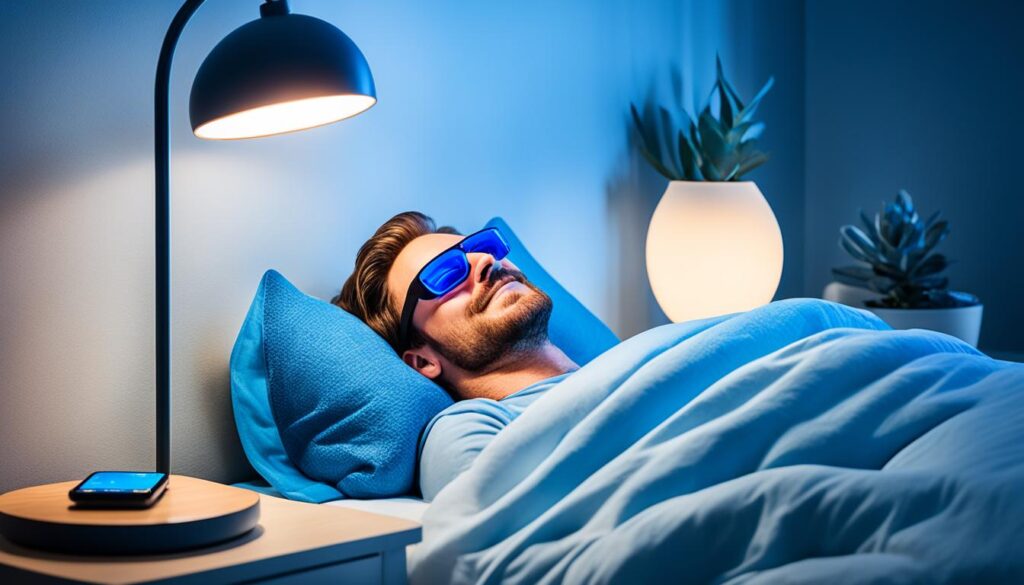Most of us have suffered from a bad night’s sleep at one time or another. The impact of long-term sleep deprivation can be significant, increasing the risk of various health issues. To improve sleep quality and ensure a restful night, it is essential to follow these 10 tips.
Key Takeaways:
- Follow these tips to sleep better and improve sleep quality.
- Establish a bedtime routine to help you fall asleep and wake up consistently.
- Create a sleep-friendly environment with proper bed support, comfort, and a clutter-free room.
- Avoid technology before bed as it can disrupt your sleep-wake cycle.
- Watch your eating habits and avoid consuming stimulating foods and drinks close to bedtime.
Take Time to Relax
Around half the UK population suffers from stress-induced sleep problems. It’s vital to relax before bed to ensure a restful night. Incorporating calming activities into your bedtime routine can help reduce stress and promote better sleep.
- Take a warm bath: Soaking in a warm bath before bed can help relax your muscles and prepare your body for sleep.
- Read a book: Reading a book can distract your mind from worry and stress, allowing you to unwind and prepare for sleep.
- Listen to soothing music: Playing soft, soothing music can create a peaceful ambiance, easing your mind and promoting relaxation.
- Write a to-do list: Jotting down a to-do list for the next day can help clear your mind of lingering tasks and worries, allowing you to relax and sleep better.
By dedicating time to cope with stress and relax before bed, you can improve your sleep quality and wake up feeling refreshed.
“A good laugh and a long sleep are the best cures for anything.”
– Irish Proverb
Winding Down with a Warm Bath
A warm bath helps relax your body and mind, making it an excellent way to wind down before bed. The soothing warm water and gentle ambiance can ease muscle tension and stress, promoting a more restful night’s sleep.
Establish a Bedtime Routine
Just like babies and children, adults also benefit from having a bedtime routine. Going to bed at a certain time allows the body to naturally fall asleep and wake up at consistent times. Be rigid about your bedtime and create a relaxation routine that helps you unwind before sleep.
Why Establishing a Bedtime Routine is Important
Having a bedtime routine helps signal to your body that it’s time to wind down and prepare for sleep. By following a consistent routine, you can train your body to fall asleep more easily and wake up feeling refreshed. A bedtime routine is especially beneficial for individuals who struggle with falling asleep or wake up frequently during the night.
The Elements of an Effective Bedtime Routine
Your bedtime routine should include activities that promote relaxation and create a peaceful environment for sleep. Here are some elements to consider:
- Dimming the lights: Lowering the brightness of your lights can signal to your brain that it’s time to start winding down.
- Unplugging from technology: Avoid using electronic devices such as smartphones, tablets, and laptops at least an hour before bed. The blue light emitted by these devices can interfere with your body’s natural sleep-wake cycle.
- Taking a warm bath or shower: A warm bath or shower can help relax your muscles and prepare your body for sleep.
- Engaging in calming activities: Reading a book, practicing meditation or deep breathing exercises, or listening to soothing music can help calm your mind and promote relaxation.
- Creating a comfortable sleep environment: Ensure your bedroom is cool, quiet, and free from distractions. Use comfortable bedding and adjust the room temperature to your preference.
Sample Bedtime Routine
| Time | Activity |
|---|---|
| 8:30 PM | Dim the lights and turn off the screens |
| 8:45 PM | Take a warm bath or shower |
| 9:00 PM | Read a book or practice meditation |
| 9:30 PM | Settle into bed, adjust room temperature, and ensure a comfortable sleep environment |
| 10:00 PM | Lights out and relax into sleep |
By establishing a bedtime routine that works for you, you can create a relaxing atmosphere before sleep and improve your chances of falling asleep quickly and waking up feeling refreshed.
Create a Sleep-Friendly Environment
To ensure a restful night’s sleep, it’s essential to create a sleep-friendly environment that promotes relaxation and comfort. Paying attention to key elements such as bed support, room temperature, and a clutter-free space can significantly impact the quality of your sleep.
Bed Support and Comfort
Your bed should provide adequate support for your body, allowing you to maintain proper spinal alignment throughout the night. Invest in a high-quality mattress and pillows that suit your personal preferences and provide the necessary comfort. The right level of firmness and cushioning can alleviate pressure points and help you sleep soundly.
Spaciousness for Restful Sleep
Having enough space in your bed is crucial for unrestricted movement during sleep. Opt for a bed size that suits your needs, considering factors such as your body size, sleeping position, and whether you share your bed with a partner or a pet. A comfortable and spacious sleeping surface can enhance your sleep quality and allow for more restorative rest.
Optimal Room Temperature
The room temperature plays a significant role in facilitating a good night’s sleep. Set your thermostat between 16°C and 18°C (60°F to 65°F) to create a cool and comfortable environment that promotes sleep. Adjusting the temperature to your preference can help regulate your body temperature and prevent overheating or feeling too cold during the night.
A Clutter-Free and Serene Space
A clutter-free bedroom can contribute to a more peaceful and relaxing atmosphere conducive to sleep. Remove unnecessary items from your sleeping area and strive for a minimalist aesthetic. Consider using pale colours on the walls and bedding, as they can evoke a sense of tranquillity and serenity. Additionally, incorporating soothing smells, such as lavender or geranium, can further enhance the calming ambience of your sleep environment.
| Key Elements for a Sleep-Friendly Environment | Benefits |
|---|---|
| Bed support and comfort | – Proper spinal alignment |
| Room temperature | – Regulated body temperature – Prevent overheating or feeling too cold |
| Clutter-free space | – Reduced distractions – Enhanced relaxation |
| Pale colors and soothing smells | – Tranquil ambiance – Sense of serenity |
Avoid Technology Before Bed
When it comes to getting a good night’s sleep, it’s essential to create a sleep-friendly environment in your bedroom. One major factor that can disrupt your sleep-wake cycle is the use of technology before bed. Devices such as smartphones, computers, and TVs emit blue light, which can suppress the sleep hormone melatonin and make it harder to fall asleep.
To optimize your sleep and promote a restful night, consider implementing these tips:
- Ban electronic devices from your bedroom: Create a technology-free zone in your bedroom by keeping your smartphone, computer, and TV outside the sleeping area. This will help you avoid the temptation to use them before bed.
- Avoid technology use for at least an hour before bed: Give yourself a technology break before sleep. Engaging in activities that don’t involve screens, such as reading a book or practising relaxation techniques, can help signal to your body that it’s time to wind down and prepare for sleep.
“The artificial blue light emitted by electronic devices can suppress melatonin production, making it harder to fall asleep.”
| Device | Blue Light Emission |
|---|---|
| Smartphone | High |
| Computer | Medium |
| TV | Medium |
As seen in the table above, smartphones emit the highest amount of blue light, followed by computers and TVs. By avoiding these devices in the hour leading up to bedtime, you can minimize blue light exposure and reduce melatonin suppression.
Creating a technology-free bedtime routine can have a significant impact on your sleep quality. By implementing these strategies, you can establish a peaceful environment that promotes relaxation and enhances your body’s natural sleep-wake cycle.

Watch Your Eating Habits
Eating a healthy diet is not only essential for your overall well-being but also plays a significant role in promoting better sleep. Certain foods can help increase the production of melatonin, the hormone responsible for regulating sleep-wake cycles. Incorporating these sleep-promoting foods into your meals can support a restful night’s sleep.
Foods rich in tryptophan and serotonin, such as milk, chicken, turkey, and pumpkin seeds, aid in the production of melatonin, thereby assisting in a good night’s sleep.
On the other hand, it’s advisable to avoid certain types of food in the hours leading up to bedtime:
- Spicy food: Spices can disrupt your digestion and cause discomfort, making it harder to sleep peacefully.
- Alcohol: While alcohol may initially make you drowsy, it can interfere with the quality of your sleep, leading to frequent awakenings during the night.
- Large meals: Eating heavy meals close to bedtime can cause indigestion and discomfort, making it difficult to fall asleep.
- Caffeine: Stimulants like caffeine can interfere with your body’s natural sleep-wake cycle, making it harder to fall asleep and stay asleep.
- Sugary food: Consuming sugary snacks or desserts before bed can lead to fluctuations in blood sugar levels, disrupting your sleep patterns.
By paying attention to your body clock and making mindful choices about what you eat, you can optimize your sleep and wake up feeling refreshed.
Prioritize Exercise and Physical Activity
Engaging in regular physical activity is crucial for maintaining good sleep quality and overall health. Not only does exercise help regulate your internal body clock, it also promotes deep sleep and reduces the likelihood of sleep disorders. However, it’s important to consider the timing of your workouts to optimize sleep.
Avoid intense exercise within two hours of bedtime, as it can stimulate your body and make it harder to fall asleep. Instead, aim to complete your workout earlier in the day, giving your body ample time to wind down and relax before sleep. Finding a time that works best for you is key, as some individuals may find that exercising in the evening enhances their sleep quality.
“Regular physical activity can significantly improve sleep patterns and overall sleep quality.” – National Sleep Foundation
By prioritizing exercise and incorporating it into your daily routine, you can enhance your sleep quality, improve your overall health, and wake up feeling refreshed and rejuvenated.
| Benefits of Exercise for Sleep Quality | Tips for Incorporating Exercise into Your Routine |
|---|---|
|
|
 |
Remember to consult with your healthcare provider before starting any new exercise program, especially if you have underlying health conditions.
Conclusion
By incorporating these 10 tips into your daily routine, you can significantly improve your sleep quality and enjoy a restful night. Prioritizing relaxation before bed, establishing a consistent bedtime routine, and creating a sleep-friendly environment are essential sleep hygiene practices that can optimize your sleep.
Additionally, watching your eating habits and avoiding technology before bed can help you sleep better. Consuming sleep-promoting foods, such as those rich in tryptophan and serotonin, while avoiding spicy food, alcohol, large meals, caffeine, and sugary food, can positively impact your sleep cycle.
Regular physical activity is also vital for achieving better sleep quality. Finding the right exercise timing, avoiding intense workouts close to bedtime, and integrating physical activity into your daily routine can contribute to improved sleep and overall health.
By adopting these tips for better sleep and practising good sleep hygiene, you can improve your sleep quality, wake up feeling refreshed, and experience the benefits of a restful night. Prioritize your sleep, and enjoy the positive impact it will have on your overall well-being.
FAQ
Can taking a warm bath before bed help improve sleep quality?
Yes, activities like taking a warm bath, reading a book, or listening to soothing music can help you relax before bed and improve sleep quality.
How does having a bedtime routine benefit sleep?
Having a bedtime routine allows the body to naturally fall asleep and wake up at consistent times, promoting better sleep quality and restful nights.
What can I do to create a sleep-friendly environment?
Ensure that your bed provides proper support and comfort, set the room temperature between 16°C and 18°C (60°F to 65°F), and keep the bedroom clutter-free with pale colors and pleasant smells like lavender and geranium.
Why should I avoid using electronic devices before bed?
Electronic devices emit blue light, which suppresses the sleep hormone melatonin and disrupts your sleep-wake cycle, affecting sleep quality.
How does diet impact sleep quality?
Eating a healthy diet, rich in sleep-promoting foods like milk, chicken, turkey, and pumpkin seeds, can aid in the production of the sleep hormone melatonin. Avoid consuming spicy food, alcohol, large meals, caffeine, and sugary food in the hours before bedtime, as they can disrupt your sleep and affect your body clock.
Is exercise beneficial for sleep quality?
Engaging in regular physical activity is beneficial for sleep quality and overall health. However, avoid intense exercise close to bedtime as it can make it harder to fall asleep.
How can I improve my sleep quality?
By prioritizing relaxation, establishing a bedtime routine, creating a sleep-friendly environment, avoiding technology before bed, watching your eating habits, and engaging in regular physical activity, you can improve your sleep quality and enjoy a restful night.





